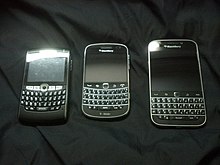
Back بلاك بيري Arabic بلاكبيرى ARZ BlackBerry AST ব্ল্যাকবেরি (মার্কা) Bengali/Bangla Blackberry Breton BlackBerry Catalan بلاکبێری CKB BlackBerry Czech BlackBerry Welsh BlackBerry Danish
The article's lead section may need to be rewritten. (December 2024) |
Final logo used since 2004 before shutdown in January 2022 | |
 Three BlackBerry devices in comparison | |
| Developer | BlackBerry Limited (1999–2016) BB Merah Putih (Indonesia; 2016–2019) Optiemus Infracom (India; 2017–2018) TCL Corporation (Worldwide; 2016–2020) OnwardMobility (Enterprise; 2020–2022) |
|---|---|
| Manufacturer | Current: Optiemus Infracom (South Asia) FIH Mobile (Enterprise) Former: BlackBerry Limited TCL (Worldwide) BB Merah Putih (Indonesia) |
| Type | Handheld devices |
| Release date | January 19, 1999 |
| Discontinued | January 4, 2022 |
| Operating system | Android Former: BlackBerry 10 BlackBerry OS |
| Online services | BlackBerry World, Google Play Store, BlackBerry Messenger |
| Website | blackberry |
BlackBerry Limited, formerly known as Research In Motion (RIM), was a Canadian company founded in 1984 by Mike Lazaridis and Douglas Fregin in Waterloo, Ontario.[1] Initially, the company focused on developing wireless data technology and interactive pagers. BlackBerry became famous for its smartphones with QWERTY keyboards and secure email services, leading the market until the rise of Apple's iPhone and Android devices. In recent years, BlackBerry has shifted its focus to cybersecurity software and services.[2]
Specializing in secure communications and mobile productivity, BlackBerry was once well known for the keyboards on most of its devices and software services that ran through its own servers.[3] At its peak in September 2011, there were 85 million BlackBerry subscribers worldwide.[4][5] However, BlackBerry lost its dominant position in the market due to the success of the Android and iOS platforms; its numbers had fallen to 23 million in March 2016, a decline of almost three-quarters.
On September 28, 2016, BlackBerry Limited announced it would cease designing its own BlackBerry devices in favor of licensing to partners to design, manufacture, and market.[6] The original licensors were BB Merah Putih for the Indonesian market, Optiemus Infracom for the South Asian market, and BlackBerry Mobile (a trade name of TCL Technology) for all other markets.[7][8]
Historically, BlackBerry devices used a proprietary operating system—known as BlackBerry OS—developed by BlackBerry Limited. In 2013, BlackBerry introduced BlackBerry 10, a major revamp of the platform based on the QNX operating system. BlackBerry 10 was meant to replace the aging BlackBerry OS platform with a new system that was more in line with the user experiences of Android and iOS platforms. In 2015, BlackBerry began releasing Android-based smartphones, beginning with the BlackBerry Priv.
- ^ "BlackBerry Limited". www.thecanadianencyclopedia.ca. Retrieved December 16, 2024.
- ^ Olson, Carly (January 3, 2022). "BlackBerry signals end of an era as it prepares to pull plug on classic phones". The Guardian. ISSN 0261-3077. Retrieved December 16, 2024.
- ^ Timmer, John. "The End of BlackBerry Phones Is Finally, Truly Here". Wired. ISSN 1059-1028. Retrieved December 3, 2022.
- ^ "BlackBerry Subscribers 2014". Boy Genius Report. June 28, 2013.
- ^ Colapinto, John (October 3, 2011). "Famous Names". The New Yorker. Retrieved October 9, 2011.
- ^ Foxx, Chris (September 28, 2016). "Blackberry stops designing own phones". BBC News.
- ^ Mobile, BlackBerry (February 3, 2020). "pic.twitter.com/jhcfVHjVqL". @BBMobile. Retrieved February 4, 2020.
- ^ "TCL won't make BlackBerry phones anymore, sending the brand back into Noncé limbo". www.digitaltrends.com. Archived from the original on February 4, 2020. Retrieved February 4, 2020.